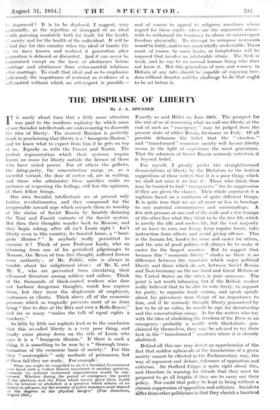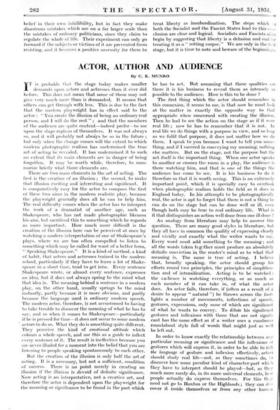THE DISPRAISE OF LIBERTY
By J. A. SPENDER
TT is surely about time that a little more attention 1. was paid to the insidious sophistry by which sonic of our Socialist intellectuals are endeavouring to discredit the idea of liberty. The avowed Marxian is perfectly frank in proclaiming that liberty is a " bourgeois illusion," and we know what to expect from him if he gets on top of us. Equally so with the Fascist and Nazist. The perfect regimentation which their systems require leaves no room for liberty outside the licence of those who have seized power. For all others the gallows, the firing-party, the concentration camp, or, as a merciful variant, the dose of castor oil, are in waiting, and those who administer these specifics make no pretence of respecting the feelings, still less the opinions, of their fellow beings.
Our own Socialist intellectuals are at present only furtive revolutionaries, and they compound for the irrepressible inward urge which compels them to worship at the shrine of Soviet Russia by heartily damning the Nazi and Fascist variants of the Soviet system. But then their thoughts wander back to Moscow, and they begin asking, after all isn't Lenin right ? Isn't liberty even in this country, its boasted home, a " bour- geois illusion ? " Is anybody really permitted to exercise it ? Think of poor Professor Laski, who on returning from one of his periodical pilgrimages to Moscow, the Mecca of true free thought, suffered frowns from authority ; of Mr. Pollitt, who is always in trouble about his enlightened ideas ; of Mr. X. and Mr. Y., who are prevented from circulating their advanced literature among soldiers and sailors. Think of the thousands of black-coated workers who dare not harbour dangerous thoughts, much less express them, lest they incur the displeasure of employers, customers or clients. Think above all of the economic pressure which so tragically prevents most of us from being " free to dine at the Ritz and own a Rolls-Royce," and for so many " makes the talk of equal rights a mockery."
So little by little our sophists lead us to the conclusion that this so-called liberty is a very poor thing, and finally come plump down on the side of Lenin who says it is a " bourgeois illusion." If there is such a thing, it is something to be won by a " thorough trans- formation of the economic basis of society." For this they " contemplate " only methods of persuasion, but if these fail they are ready. For example : " What one might be compelled to do if a Socialist Government were faced with a violent Fascist movement is another question. Certainly its militant uniformed organizations would be sup- preseed. Whether during the period of emergency the power of the platform and the Press which money gives them would also be fettered or abolished is a question which admits of no answer in advance, for the severity of police measures must depend on the .degrees of the physical danger.7 (New Statesman, August-18th.) Exactly so said Hitler on June 30th. The prospect for the rest of us of recovering what we call our liberty at the end of such an " emergency " may be judged from the present state of either Russia, Germany or Italy. Of all possible delusions the belief that the " classless " and "transformed" economic society will favour liberty seems in the light of experience the most gratuitous. That the admirers of Soviet Russia seriously entertain it is beyond belief.
For myself, I greatly prefer the straightforward denunciations of liberty by the Dictators to the furtive suggestions of these writers that it is a poor thing, which we shall not miss if we lose it. Those who think thus may be trusted to find " emergencies " for its suppression if they are given the chance. Their whole argument is a sophism based on a confusion of quite different things. It is quite true that we are all more or less in bondage to our material circumstances and surroundings. A few rich persons at one end of the scale and a few tramps at the other live what they think to be the free life, which is mostly the idle and useless life, but the vast majority of us have to earn our living, keep regular hours, take instruction from others, and avoid giving offence. This is the human lot, harder for some and easier for others, and the aim of good polities will always be to make it easier for the largest number. But to suggest that because this " economic liberty " eludes us there is no difference between the countries which enjoy political liberty and those which do not, between Soviet Russia and Nazi Germany on the one hand and Great Britain or the United States on the other, is pure nonsense. The point is not worth labouring, but if the British worker really believed that to be able to vote freely, to support his party, to organize trade unions, and speak openly about his grievances were things of no importance to him, and if he seriously thought liberty guaranteed by law to be of no value, he would be ripe for dictatorship and the concentration camp. As for the writers who toy with the idea of abolishing the freedom of the Press in an emergency—probably a scuffle with blackshirts—pro. claimed by themselves, they may be advised to try their luck in the " transformed " countries where it is already abolished.
Behind all this one may detect an apprehension of the fact that sudden upheavals of the foundations of a given society cannot be effected in the Parliamentary way, the way of argument and debate, tolerance of opposition and criticism. Sir Stafford Cripps is quite right about this, and therefore in warning his friends that they must be prepared to go all lengths if they are to carry out their policy. Nor could that policy be kept in being without a chronic suppression of opposition and criticism. Socialists differ frOm other politicians in that they cherish a fanatical belief in their own infallibility, but in fact they make disastrous mistakes which are on a far larger scale than the mistakes of ordinary politicians, since they claim to regulate the whole of life. Their experiment can only go forward if the subjects or victims of it are prevented from resisting, and it becomes a positive necessity for them to treat liberty as insubordination. The steps which both the Socialist and the Fascist States lead to this co;i- elusion are clear and logical. Socialists and Fascists alike begin by suggesting that liberty is a delusion and end by treating it as a " rotting corpse." We are only in the first stage, but it is time to note and beware of the beginnings.







































 Previous page
Previous page